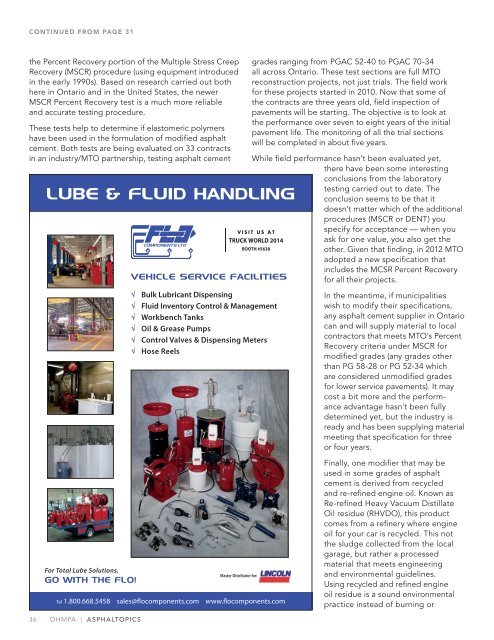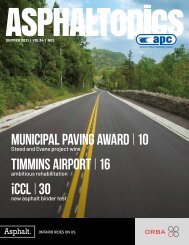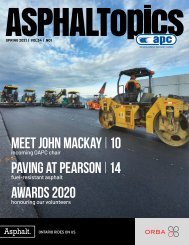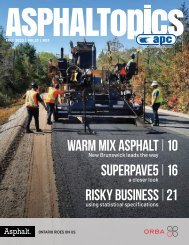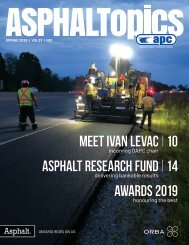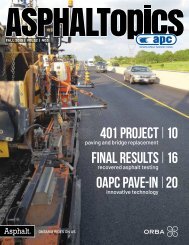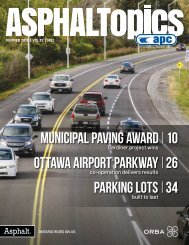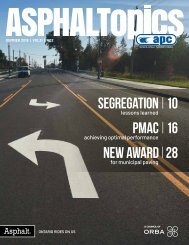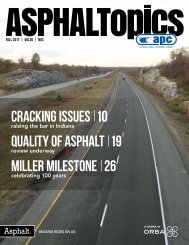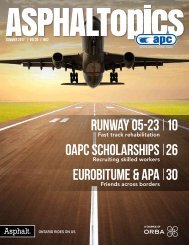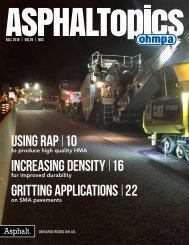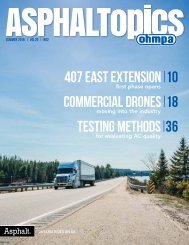ASPHALTopics | Spring 2014 | VOL 27 | NO 1
You also want an ePaper? Increase the reach of your titles
YUMPU automatically turns print PDFs into web optimized ePapers that Google loves.
CONTINUED FROM PAGE 31<br />
the Percent Recovery portion of the Multiple Stress Creep<br />
Recovery (MSCR) procedure (using equipment introduced<br />
in the early 1990s). Based on research carried out both<br />
here in Ontario and in the United States, the newer<br />
MSCR Percent Recovery test is a much more reliable<br />
and accurate testing procedure.<br />
These tests help to determine if elastomeric polymers<br />
have been used in the formulation of modified asphalt<br />
cement. Both tests are being evaluated on 33 contracts<br />
in an industry/MTO partnership, testing asphalt cement<br />
<br />
<br />
<br />
<br />
<br />
√ Bulk Lubricant Dispensing<br />
√ Fluid Inventory Control & Management<br />
√ Workbench Tanks<br />
√ Oil & Grease Pumps<br />
√ Control Valves & Dispensing Meters<br />
√ Hose Reels<br />
grades ranging from PGAC 52-40 to PGAC 70-34<br />
all across Ontario. These test sections are full MTO<br />
reconstruction projects, not just trials. The field work<br />
for these projects started in 2010. Now that some of<br />
the contracts are three years old, field inspection of<br />
pavements will be starting. The objective is to look at<br />
the performance over seven to eight years of the initial<br />
pavement life. The monitoring of all the trial sections<br />
will be completed in about five years.<br />
While field performance hasn’t been evaluated yet,<br />
there have been some interesting<br />
conclusions from the laboratory<br />
testing carried out to date. The<br />
conclusion seems to be that it<br />
doesn’t matter which of the additional<br />
procedures (MSCR or DENT) you<br />
specify for acceptance — when you<br />
ask for one value, you also get the<br />
other. Given that finding, in 2012 MTO<br />
adopted a new specification that<br />
includes the MCSR Percent Recovery<br />
for all their projects.<br />
In the meantime, if municipalities<br />
wish to modify their specifications,<br />
any asphalt cement supplier in Ontario<br />
can and will supply material to local<br />
contractors that meets MTO’s Percent<br />
Recovery criteria under MSCR for<br />
modified grades (any grades other<br />
than PG 58-28 or PG 52-34 which<br />
are considered unmodified grades<br />
for lower service pavements). It may<br />
cost a bit more and the performance<br />
advantage hasn’t been fully<br />
determined yet, but the industry is<br />
ready and has been supplying material<br />
meeting that specification for three<br />
or four years.<br />
For Total Lube Solutions,<br />
<br />
Master Distributor for:<br />
Tel 1.800.668.5458 sales@flocomponents.com www.flocomponents.com<br />
Finally, one modifier that may be<br />
used in some grades of asphalt<br />
cement is derived from recycled<br />
and re-refined engine oil. Known as<br />
Re-refined Heavy Vacuum Distillate<br />
Oil residue (RHVDO), this product<br />
comes from a refinery where engine<br />
oil for your car is recycled. This not<br />
the sludge collected from the local<br />
garage, but rather a processed<br />
material that meets engineering<br />
and environmental guidelines.<br />
Using recycled and refined engine<br />
oil residue is a sound environmental<br />
practice instead of burning or<br />
36 OHMPA | ASPHALTOPICS


